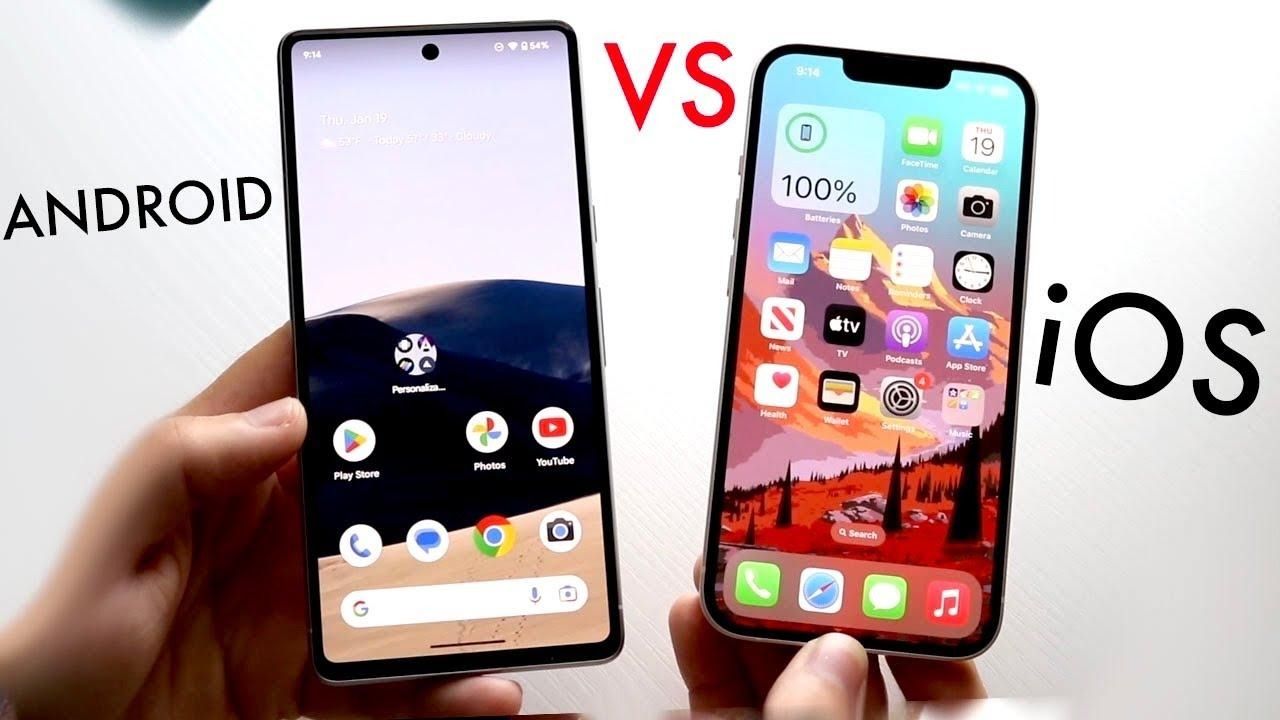

In the ever-evolving world of mobile operating systems, the battle between Android and iOS continues to captivate tech enthusiasts and consumers alike. Let’s learn more about this topic below with Unicycle Hero, as we explore the future of these dominant platforms and their potential standings in 2025.
The mobile operating system landscape has been dominated by Android and iOS for over a decade, with both platforms constantly evolving to meet user demands and technological advancements. As we approach 2025, it’s crucial to examine how these operating systems are likely to fare in the coming years, considering factors such as user experience, security, app ecosystems, and emerging technologies.
In 2025, both Android and iOS are expected to offer even more refined and intuitive user interfaces. Android, known for its customization options, is likely to continue providing users with extensive personalization features. The platform may introduce more advanced AI-driven UI elements that adapt to individual user preferences and habits, creating a truly personalized experience.
iOS, on the other hand, is anticipated to maintain its signature clean and minimalist design while incorporating more customization options. Apple may introduce more widgets and home screen customization features, bridging the gap between iOS and Android in terms of personalization. Both operating systems are expected to focus on seamless integration across devices, ensuring a cohesive user experience across smartphones, tablets, and wearables.
Accessibility features are likely to see significant improvements in both Android and iOS. Voice commands, gesture controls, and adaptive interfaces may become more sophisticated, catering to users with diverse needs and preferences. The integration of augmented reality (AR) elements into the user interface could also become more prevalent, enhancing navigation and interaction with apps and system features.
As cyber threats continue to evolve, security and privacy will remain paramount concerns for both Android and iOS in 2025. Android is expected to build upon its existing security measures, potentially introducing more robust built-in malware detection and prevention systems. Google may implement stricter app verification processes and enhance its Play Protect feature to safeguard users from potentially harmful applications.
iOS, already known for its strong security features, is likely to further strengthen its privacy protections. Apple may introduce more granular controls over app permissions and data access, giving users greater control over their personal information. Both platforms are expected to incorporate advanced biometric authentication methods, possibly including improved facial recognition, fingerprint scanning, and even new technologies like retinal scanning or behavioral biometrics.
Encryption technologies are anticipated to become more sophisticated on both Android and iOS. End-to-end encryption may become standard for more communication channels and data storage options. Additionally, both operating systems may introduce enhanced privacy features that limit data collection and tracking by third-party apps and advertisers, responding to growing user concerns about digital privacy.
The app ecosystems of Android and iOS are likely to continue thriving in 2025, with both platforms offering a wide array of applications catering to diverse user needs. Android’s Google Play Store may see improvements in app curation and discovery algorithms, making it easier for users to find high-quality apps amid the vast selection. Google may also introduce more stringent quality control measures to ensure a better overall app experience.
Apple’s App Store is expected to maintain its reputation for high-quality apps while potentially relaxing some of its strict guidelines to allow for more innovative and diverse applications. Both platforms may introduce new developer tools and frameworks to facilitate the creation of more powerful and efficient apps, particularly those leveraging emerging technologies like AR, VR, and AI.
Cross-platform app development may become more seamless, with improved tools and technologies allowing developers to create apps that work equally well on both Android and iOS. This could lead to a more unified app experience across platforms, benefiting both users and developers. Additionally, both operating systems may introduce more advanced APIs and SDKs to enable developers to create apps that integrate more deeply with system features and hardware capabilities.
As we look towards 2025, both Android and iOS are expected to embrace and integrate emerging technologies to enhance user experiences and capabilities. Artificial Intelligence (AI) and Machine Learning (ML) are likely to play increasingly significant roles in both operating systems, powering more intelligent virtual assistants, predictive features, and personalized experiences.
Android may leverage Google’s expertise in AI to introduce more advanced on-device ML capabilities, enabling smarter app suggestions, more accurate predictive text, and enhanced photo and video processing. iOS could integrate more advanced AI features into its core apps and services, potentially expanding the capabilities of Siri and introducing more intelligent automation features across the system.
Augmented Reality (AR) and Virtual Reality (VR) technologies are expected to become more prominent in both Android and iOS. These platforms may introduce more robust AR frameworks, enabling developers to create more immersive and interactive experiences. Integration of AR into navigation, shopping, and educational apps could become more seamless and widespread.
By 2025, 5G networks are expected to be widely available, and both Android and iOS will likely optimize their systems to take full advantage of these high-speed connections. This could lead to improvements in cloud gaming, real-time collaboration tools, and more sophisticated IoT device integration. Both platforms may introduce features that leverage the low latency and high bandwidth of 5G networks to enable new types of apps and services.
As foldable and flexible display technologies continue to evolve, both Android and iOS are likely to offer better support for these innovative form factors. Android may refine its existing support for foldable devices, introducing more intuitive multitasking features and optimized app experiences for various screen configurations. iOS could potentially introduce support for foldable iPhones or iPads, adapting its interface and app ecosystem to accommodate these new form factors.
In 2025, both Android and iOS are expected to offer even more seamless integration across their respective ecosystems. Android may strengthen its connections with Chrome OS and Google’s suite of services, enabling smoother transitions between smartphones, tablets, and Chromebooks. Features like Phone Hub and Nearby Share could be expanded to offer more comprehensive device syncing and file sharing capabilities.
iOS is likely to continue enhancing its Continuity features, allowing for even more seamless transitions between iPhones, iPads, Macs, and other Apple devices. This could include improvements to Handoff, Universal Clipboard, and AirDrop, as well as the introduction of new features that leverage the tight integration of Apple’s hardware and software ecosystems.
Both platforms may introduce more advanced cloud synchronization features, ensuring that user data, preferences, and app states are consistently maintained across all devices. This could lead to a more cohesive and personalized experience, regardless of which device a user is currently using within their chosen ecosystem.
As the Internet of Things (IoT) continues to grow, both Android and iOS are expected to offer more comprehensive support for smart home devices and IoT integration. Android may expand its capabilities through Google Home and other connected platforms, offering more intuitive controls and automation options for a wide range of smart devices.
iOS could further develop its HomeKit framework, potentially introducing more advanced automation features and expanding compatibility with third-party smart home devices. Both platforms may introduce more sophisticated voice control options for managing smart home devices, leveraging their respective virtual assistants to offer a more seamless and intuitive smart home experience.
In 2025, both Android and iOS are likely to place a strong emphasis on performance optimization and battery life improvements. Android may introduce more advanced power management features, leveraging AI to intelligently allocate system resources and optimize battery usage based on individual user habits and patterns.
iOS could continue refining its already efficient power management system, potentially introducing new hardware-software optimizations to extend battery life even further. Both platforms may implement more sophisticated thermal management techniques to maintain performance under heavy loads while minimizing power consumption and heat generation.
Advancements in processor technology and software optimization techniques could lead to significant performance improvements in both Android and iOS devices. This could result in smoother multitasking, faster app launches, and more responsive user interfaces across a wide range of devices, from budget-friendly models to high-end flagships.
As environmental concerns continue to grow, both Android and iOS may introduce features and optimizations aimed at reducing the ecological impact of smartphone usage. This could include more advanced power-saving modes, improved device longevity through software updates, and features that encourage users to adopt more sustainable habits in their device usage and charging patterns.
As we look ahead to 2025, it’s clear that both Android and iOS will continue to evolve and innovate, each striving to offer the best possible user experience. While it’s challenging to definitively declare a winner in this ongoing competition, both platforms are likely to maintain their strengths while addressing their weaknesses.